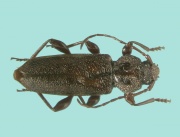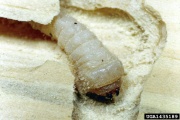Difference between revisions of "Old house borer"
Jump to navigation
Jump to search
m (Text replace - "== Authority ==" to "== Sources Checked for Data in Record ==") |
|||
| Line 1: | Line 1: | ||
| − | [[File:old house borer 2NOV04.jpg|thumb|Old House Borer | + | [[File:old house borer 2NOV04.jpg|thumb|Old House Borer ''Hylotrupes bajulus'']] |
| − | |||
| − | ''Hylotrupes bajulus'']] | ||
== Description == | == Description == | ||
| Line 9: | Line 7: | ||
== Synonyms and Related Terms == | == Synonyms and Related Terms == | ||
| − | Hylotrupes bajulus; house longhorn borer; | + | ''Hylotrupes bajulus''; house longhorn borer; |
| − | |||
| − | |||
| − | |||
| − | |||
== Additional Images == | == Additional Images == | ||
| Line 23: | Line 17: | ||
</gallery> | </gallery> | ||
| − | + | ==Resources and Citations== | |
| − | == | + | * MuseumPest.net at [https://museumpests.net/ Link] |
| − | |||
* Lynda A. Zycherman, J.Richard Schrock, ''A Guide to Museum Pest Control'', FAIC and Association of Systematics Collections, Washington DC, 1988 | * Lynda A. Zycherman, J.Richard Schrock, ''A Guide to Museum Pest Control'', FAIC and Association of Systematics Collections, Washington DC, 1988 | ||
Latest revision as of 14:31, 9 August 2022
Description
An insect from the Coleoptera order of the species Hylotrupes bajulus (L.) that is native to the Atlas Mountains. The old house borer is now found throughout the world and is a common household pest in Europe. The larvae feed on seasoned softwoods such as found in structural timbers. Adult old house borers typically emerge in June and July. Once they mate, the female lays eggs in any available cracks and crevices in wood. The larvae emerge in approximately 9 days and bore into the wood for food. The larvae stage lasts for up to 2 years during which time severe structural damage can occur.
Synonyms and Related Terms
Hylotrupes bajulus; house longhorn borer;
Additional Images
Resources and Citations
- MuseumPest.net at Link
- Lynda A. Zycherman, J.Richard Schrock, A Guide to Museum Pest Control, FAIC and Association of Systematics Collections, Washington DC, 1988




